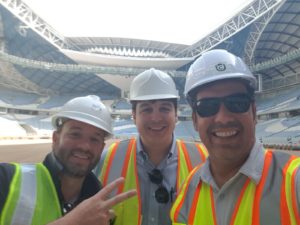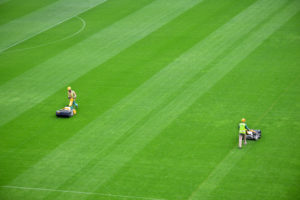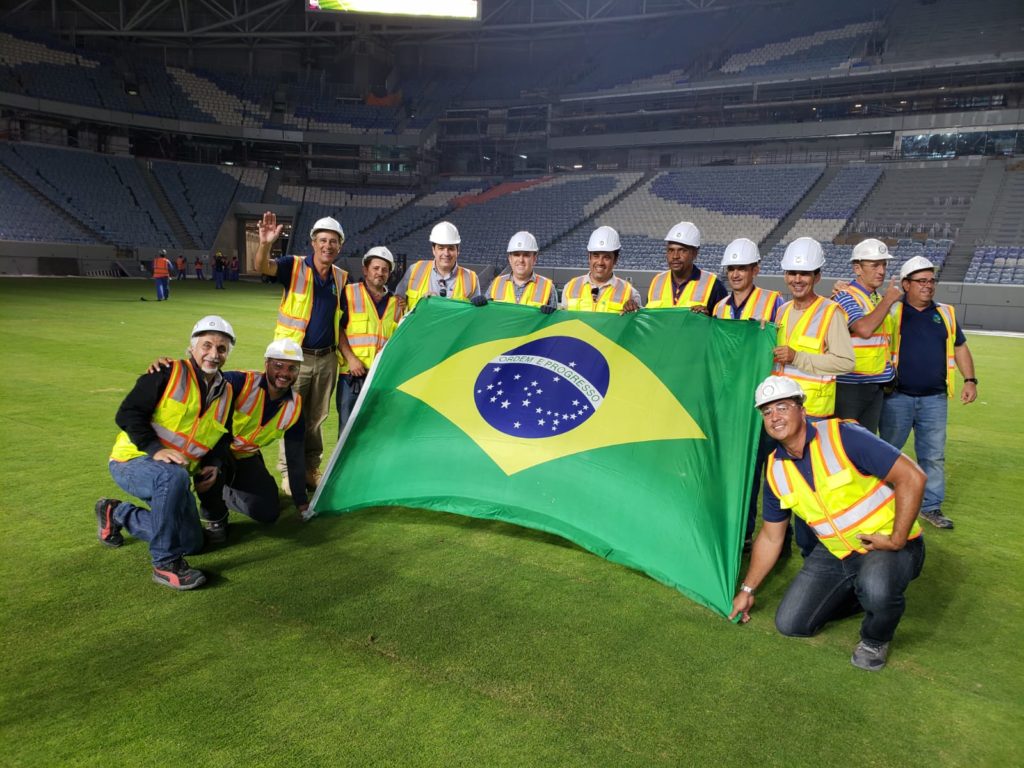São Paulo – Five out of the eight stadiums that will be used for the Qatar World Cup, which will take place from November 20 to December 18, had a Brazilian touch. The earthwork, grass installation, grain size analysis of the sands used in construction, field maintenance, vacuum drainage, underground irrigation, laser grade, hybridization and other services were developed by Brazilian turf sports field company GreenLeaf Gramados.
The opportunity in Qatar arose because the stadium managers were looking for a partner that understands the construction and maintenance of hot-climate natural grass. “We were first hired by the Al Janoub (Stadium) to make a project with them. Then we were recommended by an irrigation company to a Qatar-based firm, and we catered to Ahmad Bin Ali Stadium,” Greenleaf Gramados partner Flávio Piquet told ANBA.
Through an engineer that was present in each of the five stadiums (Al Janoub, Al Thumama Stadium, Education City, Al Bayt Stadium, and Ahmad Bin Ali), the Brazilian company, which also supplied market intelligence, said how many people need to work each day developing the activities. Picture above, the GreenLeaf team at Al Janoub.

“I need you to hire the freight of the turfgrass that comes from the United States in carboard boxes by plane, I need this sand to go through grain size analysis, and we did the analyses, so that everything could work,” Piquet said. “On days we had to do more specific stuff like assembling irrigation systems and levelling the field, for example, we sent employees from Brazil as they don’t have people trained to do so there. But a large part of the workforce was hired in loco, as well as the equipment. We mostly sold the intelligence.”
Although all grasses used in the stadiums are natural, from the same species and originated from the US, the services provided by GreenLeaf were not the same in every stadium. In Al Bayt, for example, a vacuum drainage system was installed. Piquet says that before that there was a debate about whether the service would be a waste as the country only sees rain in nine days a year. “But when it rains in Qatar, it really rains in a way I had never seen elsewhere,” he says. “Since the stadium will host the semifinals, they decided to include the service, so that the matches were not cancelled if it was to rain.”

The service delivery lasted for four years through 2020 when the turfgrass of Al Thumama Stadium was delivered. Afterwards, the maintenance became the responsibility of the International Federation of Association Football (FIFA) and the Qatar-based companies that learned with GreenLeaf how to care for the venues.
But this wasn’t the first time the turf company was called to work with the Arab country. The Qatari team was invited to participate in 2019 Copa América in Brazil and stayed in a hotel in Angra dos Reis, whose training field had been built in 2014 by GreenLeaf. “The Qatari team hired us directly to maintain the turf during the 60 days they were training.”
Before these experiences, the Brazilian company was invited to provide services to another Arab country. In 2015 it did a project to improve the training center of the football team Al-Hilal Saudi Football Club in Riyadh, Saudi Arabia. “We designed a project, but the work was discontinued because they decided to build it in another terrain.”
Record in Qatar
While they were providing services in Qatar, GreenLeaf broke a record and entered the Guinness Book. In March 2019, the company installed the turf of the Janoub Stadium, which will host the opening ceremony and the match that will kick off the tournament between Qatar and Ecuador, in only 9h15. The previous installation record held by another company was 13h15, when the turfgrass was installed in the Khalifa International, which will host the World Cup final on December 18. Two months later, GreenLeaf broke its own record when it put the turfgrass in the Al Bayt Stadium. They did the full job in just 6h31.
History of the company
Founded in 1988 by managing partner Paulo Antônio Azeredo in Rio de Janeiro, GreenLeaf was created to cater to a demand of the domestic market: maintaining turf sports field. Up to that time, Piquet says, only gardening companies did that kind of job, but they were found lacking. Azeredo provided services to a gulf turf field in Angra dos Reis when he had the idea to create GreenLeaf. He wanted to take the excellence of that turf to the stadiums as well.
The 34-year-old company now has 160 employees, including 16 agronomists, and goes through all the steps of catering to stadium, from helping them buy the terrain when a football team is interested in creating a training center, quoting earthwork prices, and checking if the venue has water available and a good location. Then the company takes care of the part of project of the training center to see how it should be built to make the players more comfortable. Finally, it carries out the drainage, grass irrigation and planting, white line painting etc. In addition to the stadiums, the company also provides services to golf fields (10% of the total services).
“When the client hires the ongoing maintenance service, the company’s employees stay on site 24/7. The match lasts only 90 minutes, but there is some preparation for it to happen, like the lawn cut. In Maracanã, the grass is cut five times a week,” the partner says.
In addition to Rio de Janeiro, the company has a foothold in 10 other states and Distrito Federal: São Paulo, Santa Catarina, Goiás, Alagoas, Bahia, Ceará, Amazonas, Pernambuco, Paraíba, and Minas Gerais. GreenLeaf has no plant to produce the turfgrass, so it buys it from suppliers.
At first the goal was catering only to the country’s demand, but over time, thanks to the recognition of the work by the foreign market, internationalization came naturally.
The first country catered was Paraguay from 2005 to 2006. Then the company adjusted the turf in the Peruvian team’s training center, and in 2016 it started catering the demands of the Qatar World cup. The list of the next international demands includes the 2026 Cup. Piquet says the company is prospecting to cater to stadiums in the three countries that will host the next competition: Canada, Mexico, and the US.
“We’re prospecting for the next Cup, which will be different from the ones we had so far. This will be the first time the matches will be played in three different countries. Instead of 32 teams, this Cup will receive 48 teams, so it will have more stadiums to host the matches.”
Brazil World Cup
During the World Cup held in Brazil in 2014, GreenLeaf Gramados, in partnership with a Spain-based company (then responsible for building and maintaining the Camp Nou and the sports city in Barcelona) worked in the turfs of seven out of the 12 stadiums used in the tournament: Fonte Nova (Bahia), Maracanã (Rio de Janeiro), Mineirão (Minas Gerais), Mané Garrincha (Distrito Federal), Estádio Governador Carlos Wilson Campos (Pernambuco), Arena Castelão (Ceará), and Arena da Amazônia Vivaldo Lima (Amazonas).
In addition to the stadiums, the company was responsible for building the training centers of 14 national teams that participated in the competition. “The participation of the Spanish company was very important for us, as they brought us a technology that took us to the next level. And the 26 Spanish that came to help us were quite taken by how we managed to control the work simultaneously across Brazil, being a 4-hour flight from Amazonas.”
The company is a partner of 21 out of 40 clubs of A and B series and 5 of the C series of the Brazilian Football League and wants to double its revenue over the next years. Since many of the clubs have millions in debts and little infrastructure, GreenLeaf wants to build new fields and be responsible for their maintenance.
Special report by Rebecca Vettore for ANBA
Translated by Guilherme Miranda




